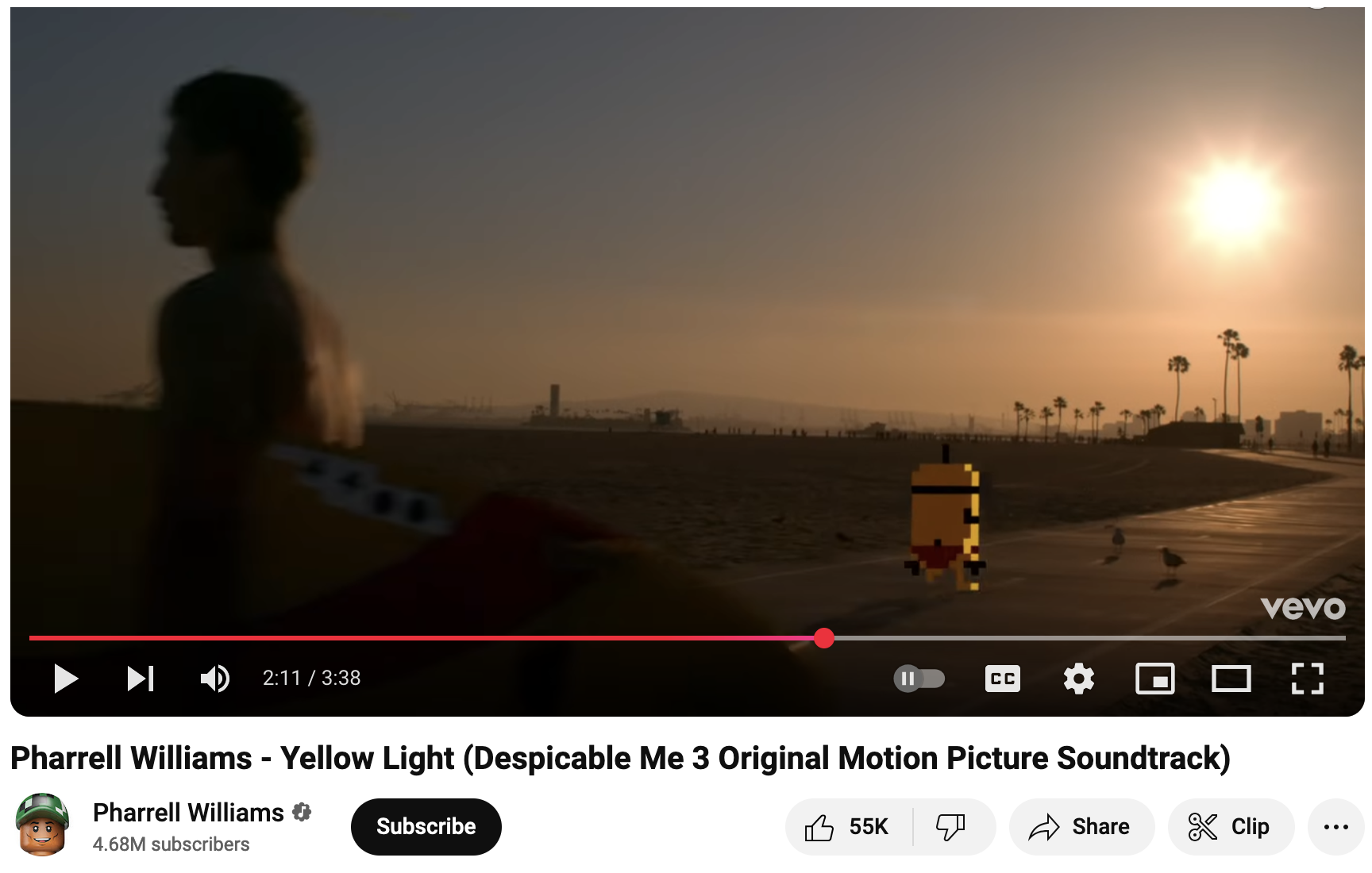Reading the Bible with Pharrell Williams
Reading AudaciouslyAmy L. Dalton
Published 21 December 2024

Over the last few months, its been challenging to say the least to make sense of the divisive and distraction-filled political landscape in the United States, let alone to determine the best way to engage with it. I know I am not alone in having a very hard time in keeping my morale up and my mind clear during this time. Amidst this difficulty, I’ve turned often to music for some sweet relief.
Amongst the songs that have been the most helpful for me is “Yellow Light” by Pharrell Williams, who seems to identify as a Universalist Christian with Pentecostal roots. Released in 2017, this song to me registers as a statement of faith both in the movement for social justice, and the power and presence of the Divine. It was written for that time precisely, and is also relevant for us now.
Many do understandably miss the political and faith references in this song, especially because its public appearance has been alongside a band of yellow cartoon blobs in the Despicable Me 3 soundtrack, part of the Minions franchise. The music video (watch it here) depicts a jovial playscape in which a yellow-clad Williams dances gleefully with video-game minions (also yellow), bananas (the yellow kind) and various other signs and symbols (all yellow). The video builds especially around one line of the song: “the one thing you can’t kill is the fun….fun fun fun fun fun!”
Clearly joy and playfulness are a key part of Williams’ understanding of the Divine.
But I got ahead of myself. How, again, is the song about God?
In the song’s chorus, the rhythmic repetition of the phrase “The yellow light shining down” is engaged in a call and response sequence in which an unnamed figure of worldly power is addressed. This figure might be a character in Despicable Me 3, or they might be Someone Else in the landscape of the times, or perhaps they just stand in for a certain sort of force in the world. Probably it’s a little of all three. At a certain point, a responder interrupts himself and shifts the focus toward another sort of power. To quote:
The yellow light shining down (Congratulations!)
The yellow light shining down (Whoop-dee-doo!)
The yellow light shining down (You control the world now!)
The yellow light shining down (Look at you!)
The yellow light shining down (I said ‘Hey!’)
The yellow light shining down (There’s a higher power!)
The yellow light shining down (Like a yellow light)
The yellow light shining down
Williams uses the image of sunlight to allude to divine power here, as well as in Happy (“Sunshine She’s here, you can take a break!), and Freedom (“Does it shock you to see / He left us the Sun?”), and perhaps also in other songs. But it is this song’s usage that to me is the most thought provoking for me in reference to current times. To me, Williams’ yellow light is an image that at once communicates about the grace, as well as authority, of the Divine — reminders that are very helpful for me right now.
The first verse shares details about the context of the times, and the nature of this principality that is being addressed:
Everyone’s overdosing the blue light use
United States of anxiety continues
The brat is in his tower singing the flag burning blues
But we feel like the nuts ‘cause we feel the screws
This passage paints a picture of the challenge, in which anxiety is being manufactured by digital communications, and this is felt more harshly by “we” on the bottom. In juxtaposition, “the brat” is high up, separated from the effects of this pressure while adding to it with a swan song about “flag burning” — a reference to the flag burning controversy that became a social media phenomenon in 2016, and has been played as a “rerun” several times since.
The line about the tower evokes for me two biblical references. First, and especially in conjunction with the line in the chorus “You control the world now,” I am reminded about the moment when the devil tempted Jesus by taking him to “a very high mountain” from which he could look down on all parts of the world. “All this I will give you,” the devil said, “if you will bow down and worship me.” (Matthew 4:8-9). Second, I am reminded of the story of how God allows for confusion to emerge amongst humans after we tried to “make a name for ourselves” by building the very high tower (Genesis 11:1-9). The tower in Williams’ lyric has aspects of both biblical towers – “we” have built this tower that the brat is now occupying, and we continue to engage in behavior that adds to the confusion. But “we” also feel pressed down by this.
In juxtaposition to this are the quotidian mentality of the “we”:
We don’t care ‘bout no fit
We don’t care ‘bout no trouble
We just wanna get in
Let’s make out like we’re lovers
I love this humble and full portrayal of the experience of regular humanness. Most people, when we allow ourselves to just be ourselves, really aren’t trying to “fit” some narrative. We really aren’t trying to make trouble. We just want to be allowed “in” – to live and love to the fullest.
Williams then clarifies on what is happening just then (and now):
So much for taking it slow
Now everybody knows
Here we go!
To me this verse speaks of the quickening of consciousness that has happened as we’ve observed the growing strength of reactionary politics. In our attempts to make political change, some are always advocating for a slow, incremental approach, and sometimes this seems like the only available option. Nina Simone famously bewailed this mentality in her ballad Mississippi Goddamn: “They keep on sayin’ ‘go slow’… [but] to do things gradually would bring more tragedy!”
But, in this moment, the curtain has been pulled back. We now no longer have the option to say “go slow.” “Everybody” (relatively speaking) now sees what is happening, and what is at stake. There is now only one option: Time to speed up. Here we go!
When I experience this song, and particularly Williams repeated call, “Here we go!” I am reminded of the biblical term “quickening.” The term appears several times in the Psalms and the Christian New Testament. Mostly we don’t comment on the term because they are often clearly seem to reference a very specific process of moving from death to life. But there are also many verses in which the term is used as a metaphor for recover from spiritual death. Indeed it often seems that God causes the quickening for this purpose. For God, it seems, when things speed up, the essence of life becomes fuller and more accessible to us. As we prepare for a wild ride ahead, this is good medicine.
There follow two additional assertions about the logic of the Spirit amidst a time of escalating confusion:
When the stupid gets injected
The sunlight’s the best disinfectant
Oh, just let the sun dry
It be like that sometimes
and:
You can kill whatever you want
And undo what was done
But one thing you can’t kill is the fun
The forces of confusion produce fruits of ignorance that have lethal consequences. They build strength through willful efforts to undo the small steps we have slowly made toward justice. They organize support for the idea that killing innocents is a necessary and acceptable collateral damage. We often feel as if we have very little power in the face of this. Amidst this, we must remember that “there’s a higher power.” We can and must believe that “sunlight” will have a cleansing effect and “fun” — or the joy of life — cannot be killed. This yellow light signifies both the power and the graciousness of the Transcendent. The components of this that Williams lifts up are the ability to shine a light of truth, the ability to slow down the forces of confusion, and the ability to generate joy. We should organize in a way that draws strength from these qualities, and seeks to mimic and extend them.
The most important message in Yellow Light, I think, is this confidence in the face of suffering and difficulty that our movements for justice and truth can respond to this stepped up pressure, and an invitation for all of us to do so with a spirit of joy. His song communicates the same message that Jesus communicated to his disciples in John 16:20-22:
“Very truly, I tell you, you will weep and mourn, but the world will rejoice; you will have pain, but your pain will turn into joy. When a woman is in labour, she has pain, because her hour has come. But when her child is born, she no longer remembers the anguish because of the joy of having brought a human being into the world. So you have pain now; but I will see you again, and your hearts will rejoice, and no one will take your joy from you.”
May it be so. Here we go!
